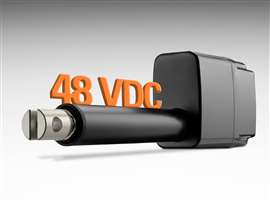Thomson’s 48 V linear actuator
05 November 2024
Applications include material handling, farm tractors
Thomson Industries said the 48 volt rating of its latest Electrak MD linear actuator equips battery powered system designers with energy efficiency, cable management and control capability that might otherwise require larger, more expensive actuators.
 Thomson Industries’ newest Electrak MD actuator now has a 48 V rating. (Photo: Thomson Industries)
Thomson Industries’ newest Electrak MD actuator now has a 48 V rating. (Photo: Thomson Industries)
“The more electrical functionality and axes of motion on a vehicle, the more sense it makes to use higher-voltage batteries to drive the actuators. By upgrading our Electrak MD actuators to handle 48 volts, we have reduced the current draw to half that of a 24-volt actuator and a quarter of that of a 12-volt actuator. This opens new doors to value-added innovation in mobile systems,” said Anders Karlsson, senior product manager - Linear Actuators at Thomson in Downers Grove, Ill.
The company said battery technology has been improving significantly in power and density, with 48 volt batteries now standard in material handling and agricultural applications.
By achieving comparable load handling with a dramatically lower current draw, the company said designers can enjoy the following benefits:
- Improved energy efficiency, which lowers costs and reduces heat
- Reduced cabling costs and simplified cable management, by allowing thinner cables
- Longer distance deployment, reducing voltage dropoff by as much as 10 times
- Higher controllability through more efficient integration involving CANopen, SAE J1939 and smart features such as position feedback
The companyu said the Electrak MD 48 V actuator enables advanced motion control wherever 48 volt batteries are in use. This is especially valuable today in logistics and material handling applications such as forklifts and AGVs, which are both operator-driven and autonomous.
Agricultural equipment is another potential application, it said. Actuators in electric power takeoff (ePTO) mechanisms on tractors, for example, help transfer power to other vehicle equipment, and the low current demand makes the entire system more efficient. Similarly, the low current demand could improve the efficiency of automated harvesting systems.
The availability of the Electrak MD 48 V completes Thomson’s power options. Designers now have greater flexibility to mix and match 12, 24 and 48 volt-rated actuators to move loads of up to 25 kN, without having to configure subsystems such as DC converters.
“If you have automation on six or seven axes, each drawing about five amps, you may still need to design for 100 amps inrush for the motors, leaving little room to run actuators for ancillary functions such as adjustments and locking. With the Electrak MD 48 V, you can make everything fit without having to reconfigure for a larger system than you need,” said Karlsson.
CONNECT WITH THE TEAM





